Unit 3 Topic 1 What's your hobby? Section B课件(共28张PPT) 仁爱版八年级上册
文档属性
| 名称 | Unit 3 Topic 1 What's your hobby? Section B课件(共28张PPT) 仁爱版八年级上册 |
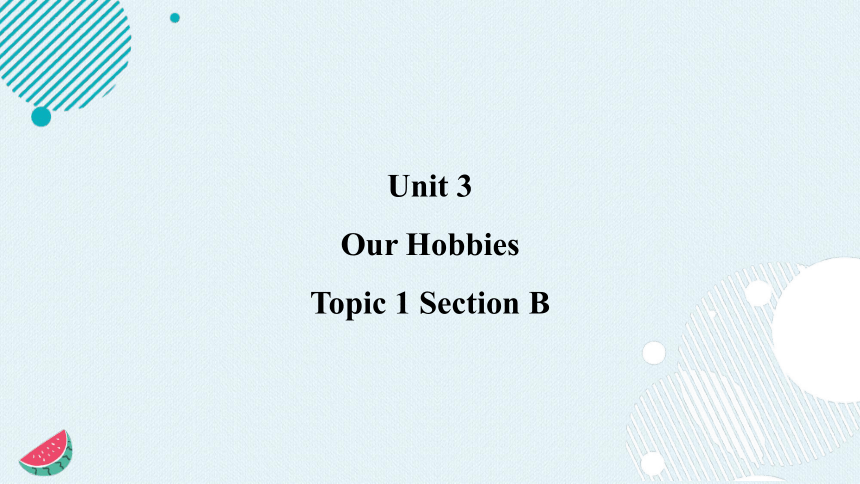
|
|
| 格式 | pptx | ||
| 文件大小 | 14.6MB | ||
| 资源类型 | 教案 | ||
| 版本资源 | 仁爱科普版 | ||
| 科目 | 英语 | ||
| 更新时间 | 2024-08-06 14:28:12 | ||
图片预览

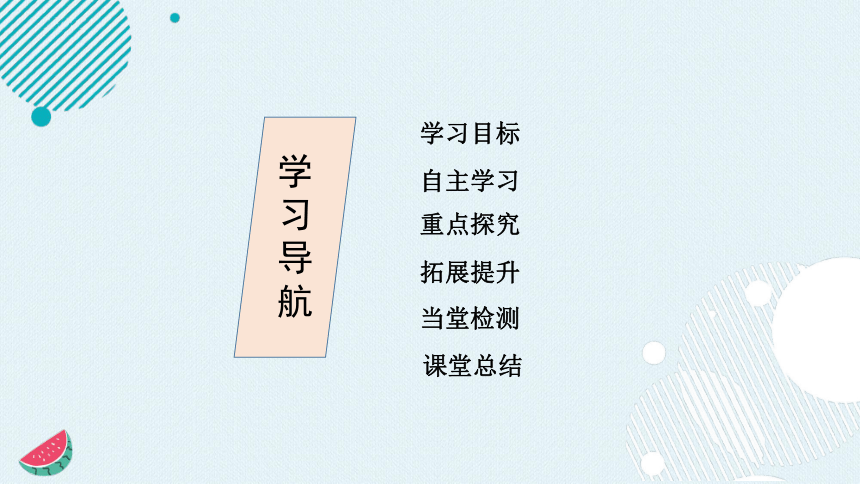
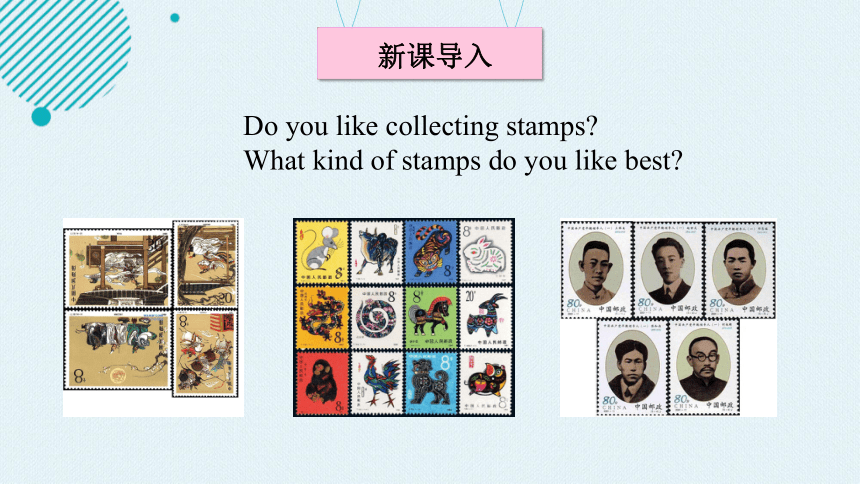
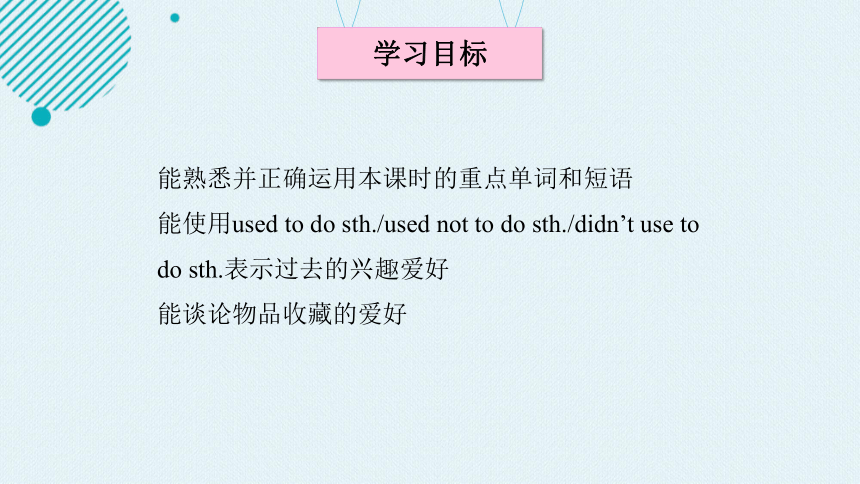
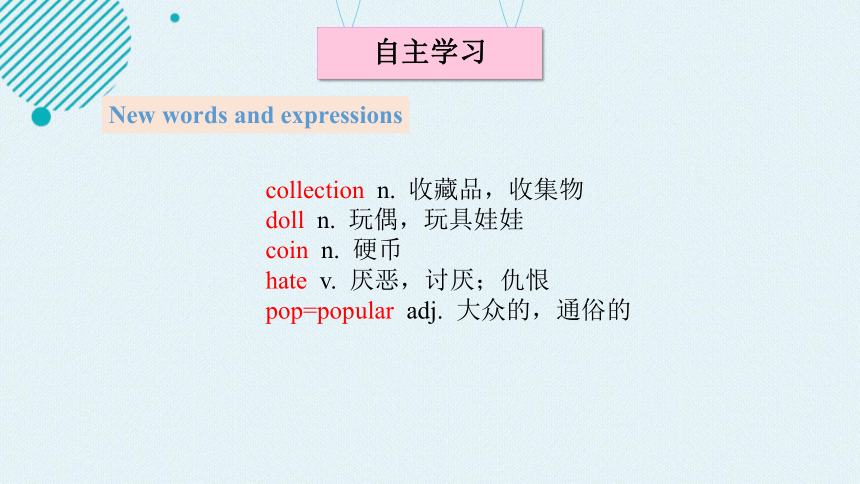

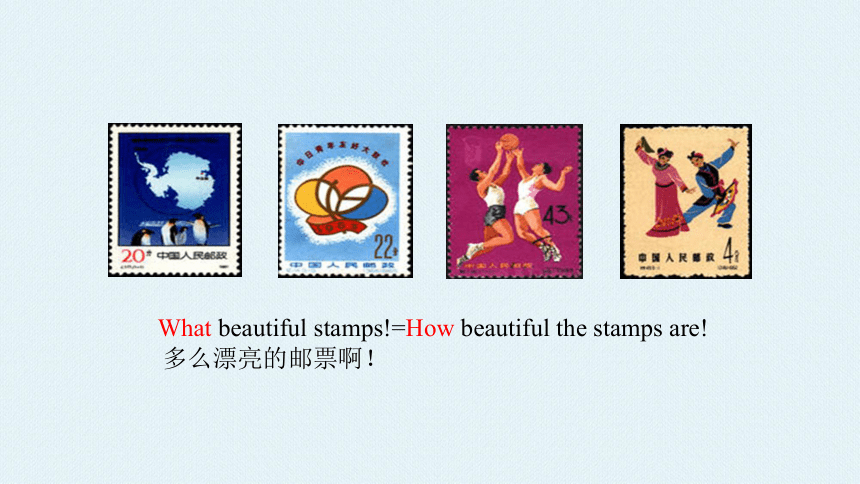
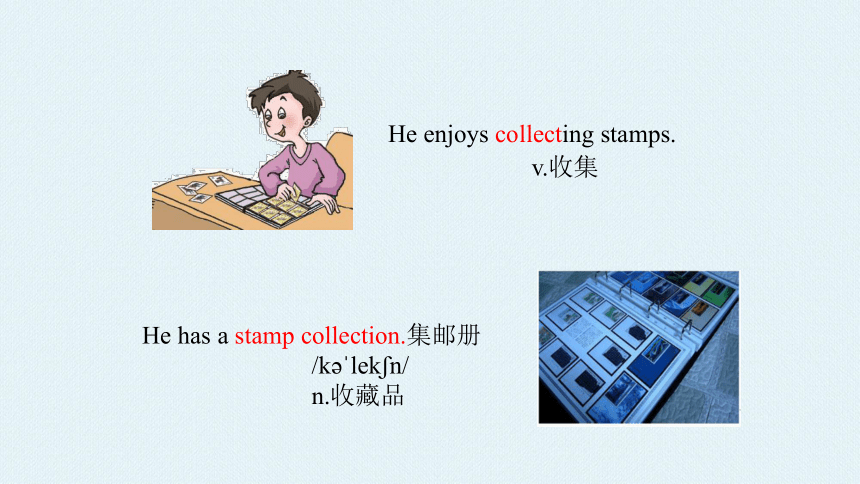
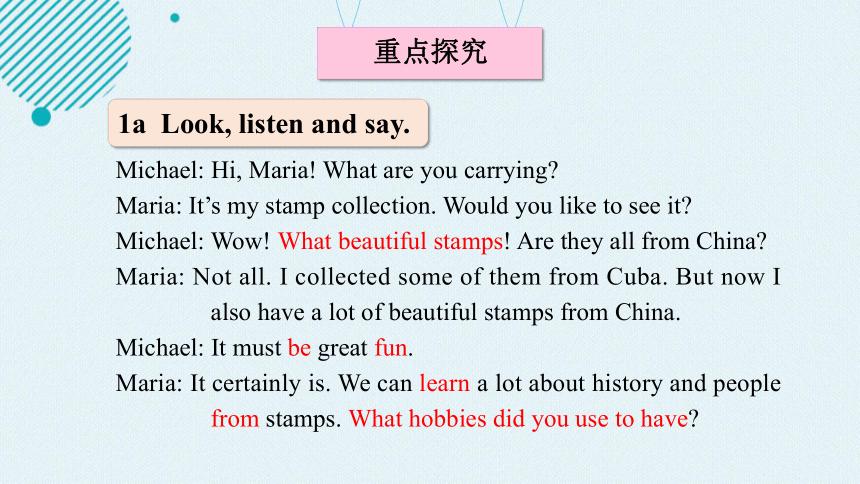
文档简介
(共28张PPT)
Unit 3
Our Hobbies
Topic 1 Section B
学习目标
重点探究
自主学习
学习导航
当堂检测
课堂总结
拓展提升
新课导入
Do you like collecting stamps
What kind of stamps do you like best
学习目标
能熟悉并正确运用本课时的重点单词和短语
能使用used to do sth./used not to do sth./didn’t use to do sth.表示过去的兴趣爱好
能谈论物品收藏的爱好
自主学习
New words and expressions
collection n. 收藏品,收集物
doll n. 玩偶,玩具娃娃
coin n. 硬币
hate v. 厌恶,讨厌;仇恨
pop=popular adj. 大众的,通俗的
flowers
people
places of interest
animals
special events
What beautiful stamps!=How beautiful the stamps are!
多么漂亮的邮票啊!
He enjoys collecting stamps.
v.收集
He has a stamp collection.集邮册
/k lek n/
n.收藏品
Michael: Hi, Maria! What are you carrying
Maria: It’s my stamp collection. Would you like to see it
Michael: Wow! What beautiful stamps! Are they all from China
Maria: Not all. I collected some of them from Cuba. But now I also have a lot of beautiful stamps from China.
Michael: It must be great fun.
Maria: It certainly is. We can learn a lot about history and people from stamps. What hobbies did you use to have
1a Look, listen and say.
重点探究
Michael: I used to collect baseball cards. But now I’m
interested in basketball.
(Here comes Kangkang.)
Kangkang: Hi, Maria! Hi, Michael! What
are you looking at
Michael: Hi, Kangkang! We are looking at Maria’s stamp
collection. Where are you going
Kangkang: I’m going swimming. It’s my favorite hobby.
1. Maria only collects Chinese stamps.
2. Michael’s favorite hobby is playing baseball.
3. Kangkang is fond of swimming.
4. We can learn a lot about history and people from stamps.
True False
True False
True False
True False
1b Listen to 1a and circle True or False.
Maria likes ________ stamps and she ________ them when she was in Cuba. She thinks we can learn a lot about _______ and ______ from stamps. And now she has many beautiful Chinese stamps. Michael _________ collect baseball cards when he was in America. Now ________ basketball is his hobby. Kangkang is interested in __________ . The three children have different _________ .
collecting
collected
people
history
used to
playing
swimming
hobbies
1c Read 1a and fill in the blanks.
telephone cards
model planes
dolls
★
★
2 Listen to the conversation and check the
collections you hear.
photos of famous stars
stamps
coins
★
★
keep pets listen to music watch TV
play computer games go shopping play soccer
3 Talk about your hobbies in groups with the
following expressions.
I used to
like/love /enjoy
but now I
hate it.
don’t like/enjoy/love it.
I
am fond of /
interested in …
A: I used to enjoy pop music, but now I don’t like it. I
love playing sports.
B: I didn’t use to go shopping, but now I like it.
Example:
—What do you love collecting Why
—I love collecting …
Pair Work
Talk about your collections with your friends.
Name
Hobby
In the past
Now
Make a survey about hobbies in plete
the table and then report it to the class.
Xiao Wei likes …
But he used to … one year ago.
…
Report
/s/: stamps comics desks
/z/: stones dolls coins
/ts/: pets kites sports
/dz/: friends beds cards
4 Read the following words and pay attention to
the sounds of the underlined parts. Find the rules
and add more words to each group .
1. 'hobbies 'certainly 'favorite 'interested
2. be 'fond of 'listen to 'music 'fly 'kites 'model 'planes
3. I 'didn't use to 'keep 'pets, but 'now 'I love it.
4. I 'used to 'enjoy 'swimming, but 'now I 'don't like it.
4b Listen and pay attention to the stress. Then read
after the taps and imitate.
Language points
拓展提升
1.What beautiful stamps! 多么漂亮的邮票啊!感叹句结构:(1)How + 形容词/副词(+主语+谓语)! 感叹句中主语和谓语常省去。 如:①How tall (the tree is)! ②How fast (he runs)!(2)What + (a / an) + 形容词+ 名词(+主语+ 谓语)!当名词为可数名词单数时,用a/an, 如:What a tall tree (it is) !当此名词为复数或不可数名词时,不要a/an, 如:①What tall trees (they are)! ②What bad weather (it is)!
2. It must be great fun! 它(集邮)肯定非常有趣! must 在肯定句中表示推测,意为“一定是,必定是”,如: Kate isn’t watching TV. She must be reading in the study.
凯特没在看电视。 她一定在书房里看书。
3. I used to collect baseball cards. 我过去常常收集棒球卡。
used to do sth. 表示“过去常常做某事”,是过去的某种习惯行为(过去经常反复发生的动作或存在的状态而现在却不再具有)。
1)否定句:sb. didn’t use to. \sb. used not to. \sb. usedn’t to.
He didn’t use to get up early.
他过去常常不早起。
The river usedn’t to be clean.
这条河过去不干净。
2)一般疑问句: Did sb. use to do sth. / Used sb. to do sth.
肯定回答: Yes, sb. did. \Yes, sb. used.
否定回答:No, sb. didn’t. \No, sb. usedn’t.
e.g.:Did you use to be a teacher =Used you to be a teacher
你过去是个老师吗
3)反意疑问句:
She used to live in the country, didn't / usedn't she
There used to be a big tree here, didn't / usedn't there
【拓展】be used to (doing) sth. 表示“习惯于做某事”,可用现在、过去、将来的多种时态,be 可以用become, get 等来代替, 这一结构中to 是介词。如: He will be used to getting up early. 他将会习惯早起。
当堂检测
一、请用括号内所给单词的正确形式填空。
1.My father used to ______ (live) in the country.
2.She gets great pleasure from her stamp __________(collect) .
3.One of the famous ________ (sing) is Lu Ning’s aunt.
4. I___________(not used to )get up late when I was young.
But now I___________(be used to)__________(get up)early.
5._________ (watch) TV too much is bad for our eyes.
live
collection
singers
didn’t use to
Watching
am used to
getting up
课堂总结
Unit 3 Topic 1
Section B
重点单词和短语:
coin, hate, pop, used to, must be, learn...
from, listen to music, keep pets
表达过去常常做某事的结构:
_____________
集邮的好处:
We can learn a lot about ________and ________from stamps.
used to do sth.
history
people
Unit 3
Our Hobbies
Topic 1 Section B
学习目标
重点探究
自主学习
学习导航
当堂检测
课堂总结
拓展提升
新课导入
Do you like collecting stamps
What kind of stamps do you like best
学习目标
能熟悉并正确运用本课时的重点单词和短语
能使用used to do sth./used not to do sth./didn’t use to do sth.表示过去的兴趣爱好
能谈论物品收藏的爱好
自主学习
New words and expressions
collection n. 收藏品,收集物
doll n. 玩偶,玩具娃娃
coin n. 硬币
hate v. 厌恶,讨厌;仇恨
pop=popular adj. 大众的,通俗的
flowers
people
places of interest
animals
special events
What beautiful stamps!=How beautiful the stamps are!
多么漂亮的邮票啊!
He enjoys collecting stamps.
v.收集
He has a stamp collection.集邮册
/k lek n/
n.收藏品
Michael: Hi, Maria! What are you carrying
Maria: It’s my stamp collection. Would you like to see it
Michael: Wow! What beautiful stamps! Are they all from China
Maria: Not all. I collected some of them from Cuba. But now I also have a lot of beautiful stamps from China.
Michael: It must be great fun.
Maria: It certainly is. We can learn a lot about history and people from stamps. What hobbies did you use to have
1a Look, listen and say.
重点探究
Michael: I used to collect baseball cards. But now I’m
interested in basketball.
(Here comes Kangkang.)
Kangkang: Hi, Maria! Hi, Michael! What
are you looking at
Michael: Hi, Kangkang! We are looking at Maria’s stamp
collection. Where are you going
Kangkang: I’m going swimming. It’s my favorite hobby.
1. Maria only collects Chinese stamps.
2. Michael’s favorite hobby is playing baseball.
3. Kangkang is fond of swimming.
4. We can learn a lot about history and people from stamps.
True False
True False
True False
True False
1b Listen to 1a and circle True or False.
Maria likes ________ stamps and she ________ them when she was in Cuba. She thinks we can learn a lot about _______ and ______ from stamps. And now she has many beautiful Chinese stamps. Michael _________ collect baseball cards when he was in America. Now ________ basketball is his hobby. Kangkang is interested in __________ . The three children have different _________ .
collecting
collected
people
history
used to
playing
swimming
hobbies
1c Read 1a and fill in the blanks.
telephone cards
model planes
dolls
★
★
2 Listen to the conversation and check the
collections you hear.
photos of famous stars
stamps
coins
★
★
keep pets listen to music watch TV
play computer games go shopping play soccer
3 Talk about your hobbies in groups with the
following expressions.
I used to
like/love /enjoy
but now I
hate it.
don’t like/enjoy/love it.
I
am fond of /
interested in …
A: I used to enjoy pop music, but now I don’t like it. I
love playing sports.
B: I didn’t use to go shopping, but now I like it.
Example:
—What do you love collecting Why
—I love collecting …
Pair Work
Talk about your collections with your friends.
Name
Hobby
In the past
Now
Make a survey about hobbies in plete
the table and then report it to the class.
Xiao Wei likes …
But he used to … one year ago.
…
Report
/s/: stamps comics desks
/z/: stones dolls coins
/ts/: pets kites sports
/dz/: friends beds cards
4 Read the following words and pay attention to
the sounds of the underlined parts. Find the rules
and add more words to each group .
1. 'hobbies 'certainly 'favorite 'interested
2. be 'fond of 'listen to 'music 'fly 'kites 'model 'planes
3. I 'didn't use to 'keep 'pets, but 'now 'I love it.
4. I 'used to 'enjoy 'swimming, but 'now I 'don't like it.
4b Listen and pay attention to the stress. Then read
after the taps and imitate.
Language points
拓展提升
1.What beautiful stamps! 多么漂亮的邮票啊!感叹句结构:(1)How + 形容词/副词(+主语+谓语)! 感叹句中主语和谓语常省去。 如:①How tall (the tree is)! ②How fast (he runs)!(2)What + (a / an) + 形容词+ 名词(+主语+ 谓语)!当名词为可数名词单数时,用a/an, 如:What a tall tree (it is) !当此名词为复数或不可数名词时,不要a/an, 如:①What tall trees (they are)! ②What bad weather (it is)!
2. It must be great fun! 它(集邮)肯定非常有趣! must 在肯定句中表示推测,意为“一定是,必定是”,如: Kate isn’t watching TV. She must be reading in the study.
凯特没在看电视。 她一定在书房里看书。
3. I used to collect baseball cards. 我过去常常收集棒球卡。
used to do sth. 表示“过去常常做某事”,是过去的某种习惯行为(过去经常反复发生的动作或存在的状态而现在却不再具有)。
1)否定句:sb. didn’t use to. \sb. used not to. \sb. usedn’t to.
He didn’t use to get up early.
他过去常常不早起。
The river usedn’t to be clean.
这条河过去不干净。
2)一般疑问句: Did sb. use to do sth. / Used sb. to do sth.
肯定回答: Yes, sb. did. \Yes, sb. used.
否定回答:No, sb. didn’t. \No, sb. usedn’t.
e.g.:Did you use to be a teacher =Used you to be a teacher
你过去是个老师吗
3)反意疑问句:
She used to live in the country, didn't / usedn't she
There used to be a big tree here, didn't / usedn't there
【拓展】be used to (doing) sth. 表示“习惯于做某事”,可用现在、过去、将来的多种时态,be 可以用become, get 等来代替, 这一结构中to 是介词。如: He will be used to getting up early. 他将会习惯早起。
当堂检测
一、请用括号内所给单词的正确形式填空。
1.My father used to ______ (live) in the country.
2.She gets great pleasure from her stamp __________(collect) .
3.One of the famous ________ (sing) is Lu Ning’s aunt.
4. I___________(not used to )get up late when I was young.
But now I___________(be used to)__________(get up)early.
5._________ (watch) TV too much is bad for our eyes.
live
collection
singers
didn’t use to
Watching
am used to
getting up
课堂总结
Unit 3 Topic 1
Section B
重点单词和短语:
coin, hate, pop, used to, must be, learn...
from, listen to music, keep pets
表达过去常常做某事的结构:
_____________
集邮的好处:
We can learn a lot about ________and ________from stamps.
used to do sth.
history
people
同课章节目录
- Unit 1 Playing Sports
- Topic 1 I'm going to play basketball.
- Topic 2 I'll kick you the ball again.
- Topic 3 The school sports meet is coming.
- Unit 2 Keeping Healthy
- Topic 1 You should brush your teeth twice a day.
- Topic 2 I must ask him to give up smoking.
- Topic 3 Must we exercise to prevent the flu?
- Unit 3 Our Hobbies
- Topic 1 What's your hobby?
- Topic 2 What sweet music!
- Topic 3 What were you doing at this time yesterday
- Unit 4 Our World
- Topic 1 What's the strongest animal on the farm?
- Topic 2 How can we protect ourselves from the eart
- Topic 3 The Internet makes the world smaller.
